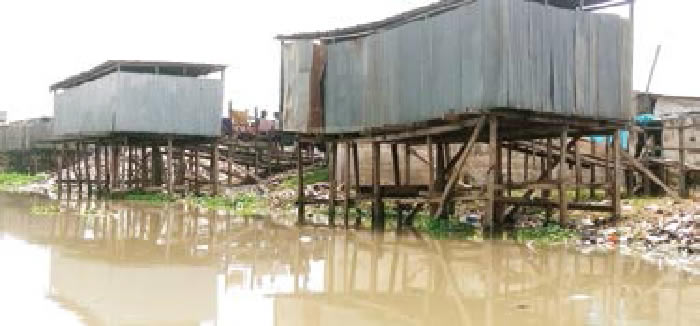
Residents and business owners in Maidan-Orile community and some parts of Mile 12 in the Kosofe Local Council Development Area of Lagos State have expressed concern over the pollution of the environment by operators of makeshift toilets in the area.
The residents lamented that the public toilets, set up by the Hausa, had made life unbearable for them.
They stated that efforts to get the attention of government agencies had failed.
During a visit to the community on Monday, PUNCH Metro observed that Maidan community and its environs reeked from the stench of human waste.
It was discovered that a popular community river had been taken over by refuse dumps and faeces.
Our correspondent, who took a canoe ride from one stretch of the river to another, observed that many of the public toilets channelled faeces into the river.
The affected areas were the riverbanks around Ibrahim Sanusi Estate, Adeyeye Street, and the Agiliti pedestrian link bridge.
It was gathered that since heavy rainfall destroyed the only bridge linking the community to Mile 12, residents had resorted to taking canoes in crossing the river.
PUNCH Metro noted that the river stunk, as faeces littered its surface.
Our correspondent sighted no fewer than 10 public toilets in different locations.
It was learnt that some Hausas in the community owned and operated the public toilets.
While three of the toilets were constructed with bricks, seven others were wooden structures.
It was gathered that residents, especially the Hausa, paid N100 to use the toilets, where they also bathed while using the river water for laundry.
Some residents, who spoke to PUNCH Metro, alleged connivance between the toilet owners and officials of the state Ministry of Environment and Water Resources.
The residents claimed public toilet business had become lucrative in the area due to the large number of Hausas in the community.
The Chairman of Maidan Patele Community Development Association, Adekunle Owolabi, claimed that the government had not been replying to different letters written by the group.
He said the odour from the river was unbearable for residents.
“The community stinks. It is like the Hausa are trying to take control of the area because the government has refused to do anything despite several appeals.
“We have written to the state government, local government, and the House of Assembly. We have reported the matter, but no action has been taken.
“Some of them with septic tanks used to release human waste into the river and when they do, nobody will be able to breathe in the community.
“The smoke and smell are becoming unbearable. We want the government to come to our aid. They should assist us with a motorable bridge and sanction these people,” Owolabi added.
Another resident, Kolawole Oyesiku, revealed that there was a cholera outbreak in the community six months ago, which led to the death of some children.
He said, “Most of the public toilets don’t have septic tanks. They just construct them as public toilets and people come to defecate directly into the river without minding the health implication.
“I had on several occasions tried contacting the Ministry of Environment, but I believe some of their officials are getting something from the public toilet owners.
“From my investigation, I also discovered that there is a kind of connivance between the local government officials who come to collect monthly dues from the public toilet owners, and there are some people from the Ministry of Environment who come to collect dues; and also from the Lagos State Waste Water Board.”
One of the toilet owners, who identified himself as Alhaji Tanko, said efforts were underway to ensure that there was proper channelling of the human waste.
He said, “We are working on getting this waste channel to the right place. We had a meeting two weeks ago and we agreed to look for a solution.
“If you observe very well, you will see that one of the public toilets now has a proper septic tank to accommodate the sewage. Many of us will follow suit.”
A medical expert, David Ogunsanya, warned that the pollution of the river could lead to water-borne diseases.
He said, “Such practice of emptying public toilet waste into river bodies leads to some serious negative effects on both the health of the people who have access to such water bodies and their environment in general.
“This results in faecal contamination of water bodies and generally the local environment leading to various water-borne diseases, which are diseases transmitted via faecal pathogens in water; the most common being diarrhoea and intestinal worm infections, but also typhoid, cholera, hepatitis, polio, trachoma, and others.”
Efforts to get the state Commissioner for Environment and Water Resources, Tunji Bello, were not successful.
He did not take his calls or reply to text messages sent to his phone and WhatsApp.
The Public Affairs Director of the ministry, Kunle Adeshina, was also not reachable for comments as of press time.





